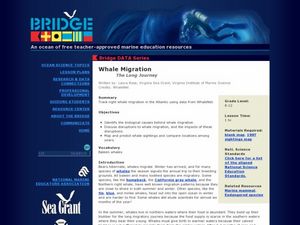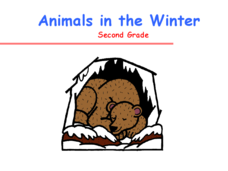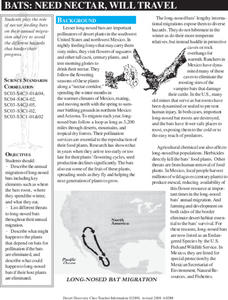National Park Service
Hibernation-Migration-Fascination
What's the difference between hibernation and a good nap? Find out with an engaging life science activity that compares the hibernation habits of grizzly bears and marmots. After learners read an informational passage about each mammal,...
Curated OER
2nd Grade - Act. 27: How Animals Prepare for Winter
What do animals do during the winter? Second graders will discover that some animals migrate and other hibernate during the winter. Using "How and Why Animals Prepare for Winter," by Elaine Pascoe, they will discuss and create a drawing...
Curated OER
Migrate, Adapt, or Hibernate
In this migration and hibernation worksheet, students read a 2 page informational excerpt about animals who adapt to changing seasons by migrating or hibernating. They then use the information they learned to answer the 15 questions on...
Curated OER
Hibernation
Explain the process behind animal hibernation. This text-rich presentation provides clear information related to weather, animal behaviors, and their coping mechanisms.
Curated OER
Whale Migration - The Long Journey
Marine biology learners examine right whale sighting data from the WhaleNet website. They plot the data on a map and write down the number of adults and calves spotted. Questions accompany the data analysis activity, making this a...
Curated OER
Hibernation and Torpor
In this hibernation worksheet, students read about the differences between hibernation and torpor. Then students determine how long it takes for an animal to warm up or cool down its body. Students complete 4 short answer questions.
Curated OER
Animals in the Winter: Second Grade
Ever wonder what animals do in winter? If your 2nd graders do then they will enjoy this PowerPoint. Each slide begins with a questions and then provides the answer, it is a short presentation but the resource links at the bottom make it...
Curated OER
Responses to Changes in the Environment
Fourth graders study ecosystems, and see how plants and animals must adapt to changes in their environment in order to survive. Pictures of the snow shoe hare in the winter and summer are shown. Learners determine that the change in...
Curated OER
Brainstorming and Creating a Graphic Organizer Using Kidspiration
Although focused on the winter ecology at Crater Lake, this lesson could be tweaked to use as a exploration of any region. After a visit to Crater Lake, learners discuss topics relating to winter in this area, such as the behavior of...
Curated OER
Get Ready, Get Set, Hibernate
Young scholars match each body part or idea from a work bank about methods of animal adaptations for winter survival. They observe as the first one, food is covered with the whole class before completing the rest of the diagram. They...
ARKive
Seasons in the Woods
Winter in the cold Northwoods of Wisconsin can be hard on animals that aren't adapted to the climate. Investigate the animals that are out and about even in the coldest winter temperatures as you and your class examine animal...
PBS
Reading Adventure Pack: Sleep
A reading adventure pack features two stories—Time to Sleep by Denise Fleming and Animals Don’t Wear Pajamas by Eve Feldman. In response to reading the fiction and nonfiction texts, scholars create a dreamcatcher, discuss hibernation,...
Curated OER
Plant and Animal Changes
Second graders listen as the book, "What Do Animals Do In Winter?" is read to the class. They discuss that during the winter, some animals migrate, hibernate, hide, change color, and some make changes in their bodies like growing extra...
Curated OER
Bats: Need Nectar, Will Travel
Beginning wildlife biologists become adult bats, baby bats, snakes, owls, bobcats, or land-clearing developers in a grand role-playing activity. In a large open space, they play a game in which they move to designated areas based on what...
Curated OER
Esperanza Rising: Lesson 7
Sixth graders discuss the vocabulary word, "migrate" and what it means and how it relates to the novel they are reading, Esperanza Rising. In this novel lesson, 6th graders read chapter 7 of their novel in small groups and complete...
Curated OER
Migration
Students study reasons for and examples of bird migration as a behavioral adaptation. They investigate the Bernoulli's Principles.
Curated OER
Get Ready to Hibernate! Migrate! or Get Fat!
Students explore the different ways which animals survive the winter months, and sort animals into correct categories using a Venn diagram.
Curated OER
Hibernating Hoopla
Pupils simulate hibernation with their stuffed animals. They predict the length of time of hibernation and type their math journal entries about sorting, graphing and draw pictures. They read bear hibernation stories.
Curated OER
How Animals Prepare for Winter
Second graders study which animal hibernate and which migrate. They observe the weather conditions related to each and complete the associated worksheets and web activity.
Curated OER
Winter
Students explore the concept of hibernation. In this winter lesson, students read Time to Sleep by Denise Fleming and discuss the content of the story. Students participate in classroom activities that require them to develop their...
Curated OER
Exploring Animal Habitats: Winter Changes
Students explore animals during the winter months. They discuss the changes that animals make during winter in order to survive. Students discuss migration, hibernation, and staying active during winter months. Students create various...
Curated OER
How Animals Prepare for the Winter
Students study animals. In this hibernation instructional activity, students are read Stranger in the Woods and they discuss what various animals do in their habitat during the winter. They work as a class to create their own hibernation...
Curated OER
BATS: NEED NECTAR, WILL TRAVEL
Students play the role of nectar feeding bats on their annual migration
and try to avoid the different hazards that hinder their progress. They describe the annual migration of long-nosed bats including key elements such as: where the...
Curated OER
Reading Research!
Students investigate the life of an animal and how it responds to winter. The lesson's focus is on reading and research skills using pictures to assist in the understanding of the information presented.

























